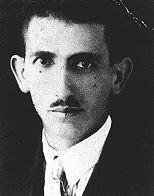
Jeno Gabor Braun
Born: 1903
Rimavska-Sec, Czechoslovakia
The son of a rabbi, Jeno was raised in the town of Sighet in Transylvania. The region was multi-ethnic, and Jeno grew up in a family that knew Yiddish, Hungarian, Romanian, German and Hebrew. During World War I, when Sighet was near the front, Jeno's family fled to Hungary. There Jeno met Eszter Mendel, whom he married after the war. The couple settled in the town of Cristuru-Secuiesc in Romania.
1933-39: As a jeweler, Jeno is one of only two watchmakers in Cristuru-Secuiesc; the other is a German who resents him as a competitor. Jeno can handle the competition and does reasonably well. This town was part of Hungary until 1918 and his language skills are useful here. He has his own shop and customers from every ethnic group. Jeno and his wife have six children, one of whom, little Sandor, takes after him because he loves the violin.
1940-44: It's been almost four years since the Hungarians marched into Cristuru-Secuiesc and annexed it to Hungary. Jeno's children were thrown out of public school because they were Jewish. He was forced to keep his shop open on Saturdays, the Jewish sabbath, and then to surrender control to a non-Jewish employee. In the spring of 1944 Jeno was forced to close the shop and his family was moved to a ghetto. His two eldest sons were drafted into the Hungarian army as conscript labor. And now, what's left of his family is being deported.
Jeno was deported to Auschwitz, and then to the Kochendorf camp, where he was beaten to death on his 42nd birthday when he failed to wake up [for roll call] in time for a 5 a.m. work detail.

